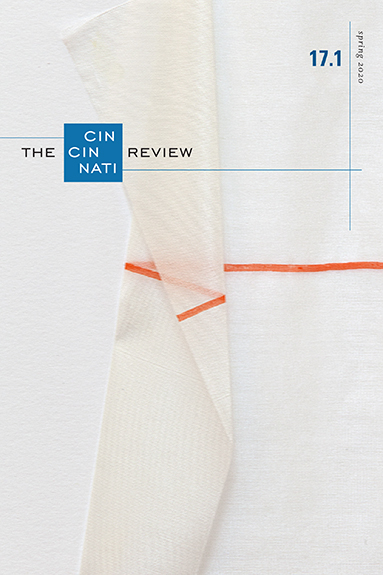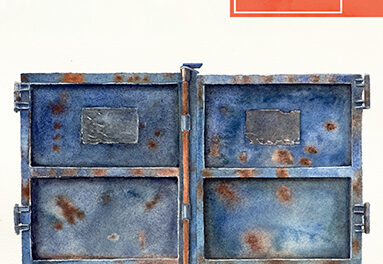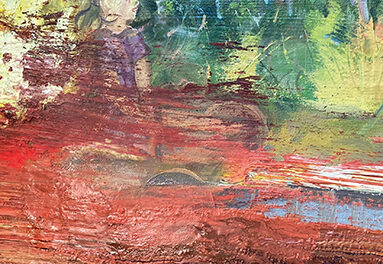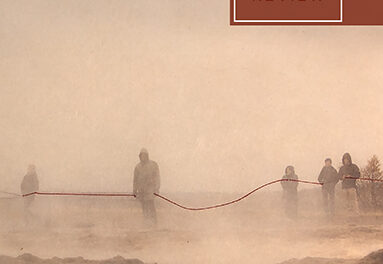The Father, Deceased
He appears in a hospital hallway. On the front porch of her home in Phoenix, with a clipboard in his hands, polite and distant, like he might ask her to switch internet service providers. Passing by on the sidewalk in Riley, the town where she grew up. Leaning out of his yellow combine. He wears jeans, red flannel rolled to his forearms, work boots coated in soil, as if he’s just come in the back door at the end of an autumn day. He is the color of golden wheat. He flickers like sunlight across their Kansas field. His crow’s-feet, deeper now, cut into his skin like far-off river valleys.
No matter where he appears, his joy looms so large that he’s nearly unrecognizable. His thick body vibrates as he grips her shoulders. She cannot recall ever seeing him so manic, not when her younger sister was born, not when they climbed out of the cellar to see their house untouched by the F4 tornado that flattened much of the township.
Gail, he says. He touches his thumb to her wrinkled cheek, a gesture so familiar and lost that she chokes back a whimper—a guttural, animal sound of recognition.
The Ex-Beau from College, Just Married
He holds his new wife’s hand no matter where they are. Awake, Gail still feels flashes of indignation and scorn in her chest, even some forty years later, but when his apparition arrives in her law office or at the Topeka State Fair, she experiences longing for camaraderie so shocking and thorough it’s as though she’s been baptized in freezing water. Never mind that he kept his real girl—the one who became his wife—in Abilene for the three years he spent with Gail at Wichita State. After his graduation he called her once from a pay phone, and then she never heard from him again. A friend’s cousin later reported back his engagement, his marriage, his prior six-year relationship with the girl from Abilene.
But in dreams all is forgotten. Gail greets his wife warmly, doesn’t say who she is, that she existed. If they’re in the law office, Gail leads his wife down the hall for tea or coffee, for kindness she can pour into a Styrofoam cup. If they’re together at the state fair, all three of them ride the Ferris wheel. The happy couple flanks her. At its zenith the ride stops. Their car swings as they gaze out over the swarm of sweating fairgoers. The parking lot catches light in the distance like clean jewelry, and everything else is the color of earth. His body radiates familiar heat. She leans to him with the urge to say, I understand now, you picked her, you made the right decision.
Instead she starts to sing their school song, and he sings too, and his wife, somehow she knows the words, so her harmony lifts them into the sky, where the white light of sun obliterates the day.
The Former Boss, 1979
First the old building, rented out by an insurance company, situated in a two-story business park just outside Derby, Kansas, the walls a dusty beige like the dead cornstalks outside. He’s not in his office. Against her chest she clutches a manila folder like a shield. Does he need to sign these documents? She flips open the folder. Oh, the unfortunate horror. He does. Where has he gone? She creeps past the conference room, where Abe and Martha sit in gray-backed chairs. They look at her with pity—she’s a twenty-two-year-old idiot and deserving of all ire and abuse directed her way. Martha’s bangs float up to the ceiling. Abe draws his finger across his throat and mouths “Dead meat.” She creeps down the worn-carpet hallway. She looks out the window and realizes it’s snowing. Now snow covers everything. These documents have gone unsigned for three months. She’s in big trouble. She notices a Life Savers wrapper on the floor under the fake fern and catches a whiff of mint and cheap cigars. He’s nearby, but where? She gazes out the dirty window, afraid to turn around. She should do it, she should turn. Quickly, get it over with. The scent of cigars—which brand were they? All she can recall is the burnt-red packaging, habitually placed on the corner of his desk, almost as an offering. She feels his labored breath on the back of her neck. Outside, the half-empty parking lot is buried under a foot of snow, and she watches a lone figure brave the wind toward a distant car. Why can’t she turn around? She hears faint crinkling as he unwraps another Life Saver, followed by the wet sound as his lips take the candy. She tries again to turn—why won’t her body move?—but before she can, she feels his hand on her waist. The manila folder is gone, the dust-covered fern recedes from her periphery, but the pressure on her hip remains.
Sophie, Age Two
Blonde curly hair spilling out under a winter cap. Fat legs made fatter by a bright turquoise snowsuit. Sophie’s father places her in a swing. Frozen mulch crunches under their boots. Gail holds the small Nikon camera gifted to her on her thirty-first birthday, long lost now, and snaps photos.
The Tornado
Silence moves across the field like a wall. Gail stands in a row of knee-high corn. A two-lane highway separates the field from a yellow house. A swing, hanging from the bough of a nearby tree, moves gently in the breeze; the lawn is as empty as the road in front of it. The sky overhead darkens into a familiar gray-blue. In the stillness of day, tension knits into Gail’s shoulders, a discomfort she recognizes from hours spent hunched over her desk. She straightens her spine and thinks of her father, that perpetual-motion machine, the ache in his shoulders born from excess movement, the opposite of hers.
. . .











